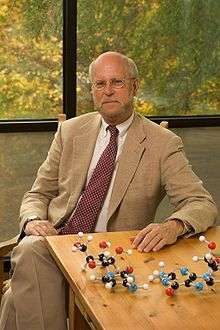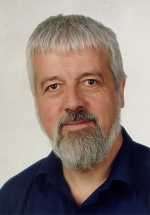Schrödinger Medal
The Schrödinger Medal is an annual award presented by the World Association of Theoretical and Computational Chemists for "one outstanding theoretical and computational chemist".[1]
Recipients
| # | Year | Name | Citation | |
|---|---|---|---|---|
| 1 | 1990 |  |
Henry F. Schaefer, III | |
| 2 | 1991 | Keiji Morokuma | ||
| 3 | 1992 | Josef Michl | ||
| 4 | 1993 | Jan Almlöf | ||
| 5 | 1994 | Leo Radom | ||
| 6 | 1995 | Werner Kutzelnigg | ||
| 7 | 1996 | Norman L. Allinger | ||
| 8 | 1997 | Nicholas C. Handy | "As the leader of the contemporary renaissance in British theoretical chemistry vis his outstanding contributions to the methods of quantum chemistry and density functional theory" | |
| 9 | 1998 |  |
Kendall N. Houk | "For achievements in the development of theoretical concepts and applications of computational methods to the understanding of the origins of organic reactivity and stereoselectivity" |
| 10 | 1999 | Björn O. Roos | "For the development of important new theoretical methods, including the CASPT2 method, and for outstanding chemical applications to the excited electronic states of molecular systems" | |
| 11 | 2000 | Axel Becke | "For the development of generalised gradient methods in density functional theory" | |
| 12 | 2001 | Ernest R. Davidson | "For a wealth of pioneering contributions to molecular and quantum mechanics" | |
| 13 | 2002 |  |
Walter Thiel | "For the development of semi-empirical methods and the application to large chemical systems" |
| 14 | 2003 | Peter Pulay | "For his development of analytic gradient methods and methods for the evaluation of NMR parameters" | |
| 15 | 2004 | Tom Ziegler | "For outstanding applications of density functional theory, especially to organometallic chemistry" | |
| 16 | 2005 | Michele Parrinello | "For the unification of molecular dynamics with density functional theory" | |
| 17 | 2006 | Donald Truhlar | "For his outstanding contributions to the theory and computation of chemical reaction dynamics in ground and excited states" | |
| 18 | 2007 | Sason Shaik | "For his outstanding contributions to the understanding of the chemical bond, reaction mechanisms in organic chemistry, and enzymatic reactivity" | |
| 19 | 2008 | Rodney J. Bartlett | "For his outstanding work on the systematic development of correlated wave function methods, especially many-body perturbation theory and coupled cluster theory" | |
| 20 | 2009 | Gernot Frenking | "For his outstanding work on computational organometallic chemistry and his fundamental contributions to the understanding of the chemical bond" | |
| 21 | 2010 | Evert Jan Baerends | "For his pioneering contributions to the development of computational density functional methods and his fundamental contributions to density functional theory and density matrix theory" | |
| 22 | 2011 | Peter Gill | "For his outstanding contributions to intracules, Coulomb operator resolutions, perturbative techniques, and two-electron systems" | |
| 23 | 2012 |  |
Pekka Pyykkö | "For his pioneering contributions to relativistic quantum chemistry" |
| 24 | 2013 | Stefan Grimme | "For his outstanding work on ab initio and density functional methods for large molecules" | |
| 25 | 2014 | Mark Gordon | "For his contributions to the development and implementation of ab initio electronic structure methods and their application to complex systems" | |
| 26 | 2015 | Helmut Schwarz | "For the successful combination of seminal experimental and computational research on mass spectrometry and catalysis" | |
See also
External links
References
- ↑ "WATOC - Schroedinger". World Association of Theoretical and Computational Chemists. 2015. Retrieved 23 March 2015.
This article is issued from
Wikipedia.
The text is licensed under Creative Commons - Attribution - Sharealike.
Additional terms may apply for the media files.